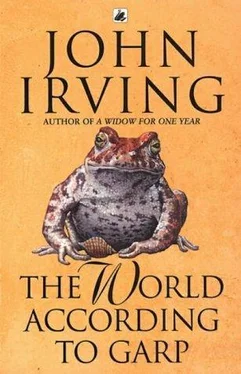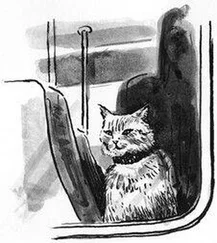“Oh boy!” Garp would holler. “Oh boy.”
When Garp had been killed, Duncan remembered, Roberta Muldoon had threatened to have her sexual reversal reversed . “I'd rather be a lousy man again,” she wailed, “than think there are women in this world who are actually gloating over this filthy murder by that filthy cunt! ”
Stop it! Stop it! Don't ever say that word!
scribbled Ellen James.
There are only those of us who loved him, and those of us who didn't know him—men and women,
wrote Ellen James.
Then Roberta Muldoon had picked them all up, one by one; she gave to them—formally, seriously, and generously—her famous bear hug.
When Roberta died, some talking person among the Fields Foundation fellows at Dog's Head Harbor called Helen on the phone. Helen, gathering herself—once again—would be the one to call Duncan in Vermont. Helen would advise young Jenny how to break the news to Duncan. Jenny Garp had inherited a fine bedside manner from her famous grandmother, Jenny Fields.
“Bad news, Duncan,” young Jenny whispered, kissing her brother on the lips. “Old Number Ninety has dropped the ball.”
DUNCAN GARP, who survived both the accident that cost him an eye and the accident that cost him an arm, became a good and serious painter; he was something of a pioneer in the artistically suspect field of color photography, which he developed with his painter's eye for color and his father's habit of an insistent, personal vision. He did not make nonsense images, you can be sure, and he brought to his painting an eerie, sensual, almost narrative realism; it was easy, knowing who he was, to say that this was more of a writer's craft than it was a craft that belonged in a picture—and to criticize him, as he was criticized, for being too “literal.”
“Whatever that means,” Duncan always said. “What do they expect of a one-eyed, one-armed artist—and the son of Garp? No flaws?”
He had his father's sense of humor, after all, and Helen was very proud of him.
He must have made a hundred paintings in a series called Family Album —the period of his work he was best known for. They were paintings modeled from the photographs he had taken as a child, after his eye accident. They were of Roberta, and his grandmother, Jenny Fields; his mother swimming at Dog's Head Harbor; his father running, with his healed jaw, along the beach. There was one series of a dozen small paintings of a dirty-white Saab; the series was called The Colors of the World . because, Duncan said, all the colors of the world are visible in the twelve versions of the dirty-white Saab.
There were baby pictures of Jenny Garp, too; and in the large, group portraits—largely imagined, not from any photograph—the critics said that the blank face, or the repeated figure (very small) with its back to the camera, was always Walt.
Duncan did not want children of his own. “Too vulnerable,” he told his mother. “I couldn't stand watching them grow up.” What he meant was, he couldn't stand watching them not grow up.
Since he felt that way, Duncan was fortunate not to have children be an issue in his life—they weren't even a worry. He came home from his four months of hospitalization in Vermont and found an extremely lonely transsexual living in his New York studio-apartment. She had made the place look as if a real artist already lived there, and by a curious process—it was almost a kind of osmosis of his things—she already seemed to know a great deal about him. She was in love with him, too—just from pictures. Another gift to Duncan's life from Roberta Muldoon! And there were some who said—Jenny Garp, for example—that she was even beautiful.
They were married, because if ever there was a boy with no discrimination in his heart about transsexuals, that boy was Duncan Garp.
“It's a marriage made in Heaven,” Jenny Garp told her mother. She meant Roberta, of course; Roberta was in Heaven. But Helen was a natural at worrying about Duncan; since Garp had died, she'd had to take over much of the worrying. And since Roberta had died, Helen felt she'd had to take over all the worrying.
“I don't know, I don't know,” Helen said. Duncan's marriage made her anxious. “That damn Roberta,” Helen said. “She always got her way!”
But this way there's no chance of unwanied pregnancy,
wrote Ellen James.
“Oh, stop it!” Helen said. “I sort of wanted granddhildren, you know. One or two, anyway.”
“ I'll give them to you,” Jenny promised.
“Oh boy,” Helen said. “If I'm still alive, kid.”
Sadly, she wouldn't be, although she would get to see Jenny pregnant and be able to imagine she was a grandmother.
“Imagining something is better than remembering something,” Garp wrote.
And Helen certainly had to be happy with how Duncan's life straightened out, as Roberta had promised.
After Helen's death, Duncan worked very hard with the meek Mr. Whitcomb; they made a respectable presentation out of Garp's unfinished novel, My Father's Illusions . Like the father and son edition of The Pension Grillparzer , Duncan illustrated what there was of My Father's Illusions —a portrait of a father who plots ambitiously and impossibly for a world where his children will be safe and happy. The illustrations Duncan contributed were largely portraits of Garp.
Sometime after the book's publication, Duncan was visited by an old, old man whose name Duncan could not remember. The man claimed to be at work on “a critical biography” of Garp, but Duncan found his questions irritating. The man asked over and over again about the events leading up to the terrible accident where Walt was killed. Duncan wouldn't tell him anything (Duncan didn't know anything), and the man went away empty-handed—biographically speaking. The man was Michael Milton, of course. It had appeared to Duncan that the man was missing something, though Duncan couldn't have known that Michael Milton was missing his penis.
The book he supposedly was writing was never seen, and no one knows what happened to him.
If the world of the reviewer seemed content, after the publication of My Father's Illusions , to call Garp merely an “eccentric writer,” a “good but not a great writer,” Duncan didn't mind. In Duncan's own words, Garp was “original” and “the real thing.” Garp had been the type, after all, to compel blind loyalty.
“ One-eyed loyalty,” Duncan called it.
He had a long-standing code with his sister, Jenny, and with Ellen James; the three of them were as thick as thieves.
“Here's to Captain Energy!” they would say, when they were drinking together.
“There's no sex like transsex!” they would shout, when they were drunk, which occasionally embarrassed Duncan's wife—although she certainly agreed.
“How's the energy?” they would write and phone and telegraph each other, when they wanted to know what was up. And when they had plenty of energy, they would describe each other as “full of Garp.”
Although Duncan would live a long, long time, he would die unnecessarily and, ironically, because of his good sense of humor. He would die laughing at one of his own jokes, which was surely a Garp-family thing to do. It was at a kind of coming-out party for a new transsexual, a friend of his wife's. Duncan aspirated an olive and choked to death in just a few seconds of violent laughter. That is a horrible and stupid way to die, but everyone who knew him said that Duncan would not have objected—either to that form of death, or to the life he'd had. Duncan Garp always said that his father suffered the death of Walt more than anyone in the family suffered anything else. And among the chosen forms of death, death finally was the same. “Between men and women,” as Jenny Fields once said, “only death is shared equally.”
Читать дальше












